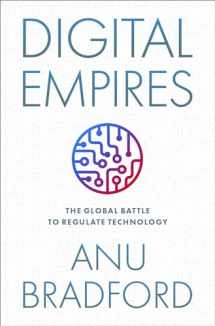
Digital Empires: The Global Battle to Regulate Technology
Book details
Summary
Description
The global battle among three dominant digital powers--the United States, China, and Europe--is intensifying as they are racing to regulate tech companies, each advancing a competing vision for the digital economy while expanding its sphere of influence in the digital world. In her provocative follow-up to The Brussels Effect, Anu Bradford explores this rivalry among the modern digital empires that will shape the world in the decades to come.
The public is increasingly concerned that digital transformation has ushered in an exceedingly concentrated economy where few powerful companies control vast economic wealth and political power, restrict competition, undermine data privacy, and widen the gap between the winners and the losers in the digital economy. The internet has also too often become a platform for disinformation, bullying, hatred, and repulsive content, undermining the safety and dignity of individuals while dividing societies and destabilizing democracies.
World leaders, who today agree on very little, are now coalescing behind the idea of reining in the most powerful tech companies. The European Union has been leading this fight for the past decade, frequently leveraging its antitrust laws, data protection laws, and other regulatory instruments to reclaim control over the tech industry. But the EU is no longer the lone crusader prepared to take on the tech giants. The Chinese government has initiated an unprecedented crackdown of its tech sector in the name of advancing "common prosperity" and ensuring that its tech companies do not overpower the authority of the state. In the United States, even the polarized Congress is now seeking to find common ground to join the regulatory battle. However, even if there is a growing global consensus that the digital economy needs to be regulated, there is no consensus on the content of that regulation.
In Digital Empires, Anu Bradford sets the stage for a showdown between markets and the state that will shape the digital economy and society for years and decades to come. She examines three competing regulatory approaches--the American market-driven model, the Chinese state-driven model, and the European rights-driven regulatory model--and discusses how governments and tech companies navigate the inevitable conflicts that arise when these regulatory approaches collide in the international domain, ultimately asking which which digital empire will prevail in their mutual contest for global influence.
Digital societies are at an inflection point. In the midst of these unfolding regulatory battles, governments, tech companies, and digital citizens are making important choices that will shape the future ethos of the digital society and define the soul of the digital economy. Digital Empires lays bare the choices we face as societies and individuals, explains the forces that shape those choices, and highlights the stakes involved in making those choices.


We would LOVE it if you could help us and other readers by reviewing the book
Book review



